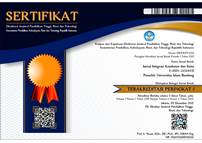Jurnal Integrasi Kesehatan dan Sains is a journal that publishes medical and health scientific articles published every 6 (six) months. Articles are original research, case reports, case studies, and literature reviews that need to be disseminated and written in Indonesian by taking into the General Guidelines for Indonesian Spelling.
Jurnal Integrasi Kesehatan dan Sains is one of the journals published by the Faculty of Medicine, Universitas Islam Bandung (Unisba) besides Global Medical and Health Communication which has a national and international reputation.
Jurnal Integrasi Kesehatan dan Sains already accredited by the National Journal Accreditation (Arjuna) managed by the Directorate General of Higher Education, Research, and Technology, Ministry of Education, Culture, Research, and Technology of the Republic of Indonesia with a Sinta 4 rating through Decree Number 158/E/KPT /2021.
eISSN: 2656-8438

Vol 6, No 2 (2024): Jurnal Integrasi Kesehatan dan Sains
Table of Contents
Articles
|
Ahmad Dzaki Hibatillah, Ricky Anggara Putranto
|
87-92
|
|
Tryando Bhatara, Dicky Santosa, Ghiffari Muhammad Suriadi
|
93-98
|
|
Anugerah Fikri Wicaksono, Ratih Tresnati, Nirmala Kesumah
|
99-106
|
|
Dony Septriana Rosady, Mia Kusmiati, Rio Dananjaya
|
107-111
|
|
Shafira Intan Anggraini, Mally Ghinan Sholih, Aliya Azkia Zahra
|
112-118
|
|
Naufis Puteri Khaerani, Luki Astuti
|
119-125
|
|
Sepvia Putri Sukma Wibowo, Aliya Azkia Zahra, Mally Ghinan Sholi
|
126-133
|
|
Mia Yasmina Andarini, Wulan Yuwita, Rosalin Naomi Harsono, Primedhia Virdiono, Gabriela Reginata
|
134-143
|
|
Sepiyani Ayu Lestari, Yumareta Anggun Nihan, Welly Windari, Isyana Salsabila
|
144-149
|
|
Shiyami Aulia Nur Darmawan, Marsah Rahmawati Utami, Devi Ratnasari
|
150-154
|
|
Mutiara Alfiyah, Imam Fathur Rahman
|
155-159
|
|
Yumareta Anggun Nihan, Welly Windari, Isyana Salsabila, Sepiyani Ayu Lestari
|
160-164
|
|
Isyana Salsabila, Sepiyani Ayu Lestari, Yumareta Anggun Nihan, Welly Windari, Alfina Oktavianti
|
165-170
|
|
Hanifa Yusmizahrah, Ajeng Annamayra, Steffi Rifasa Tohir Suriaatmadja
|
171-175
|







.png)
_(1).png)




















